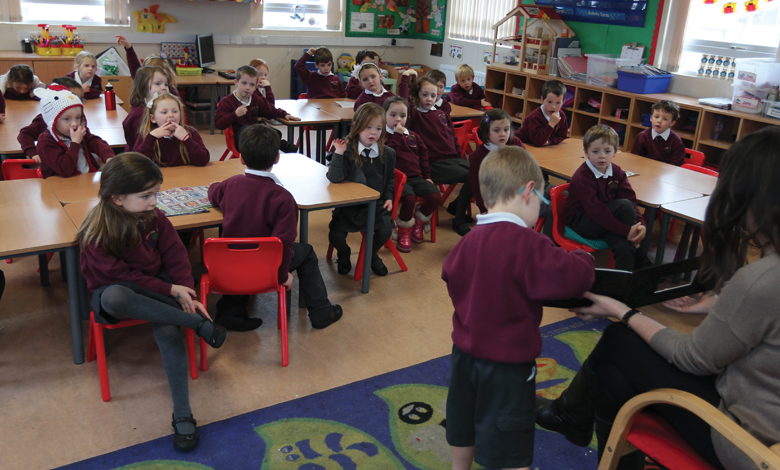Integrated education: Work in progress

The Department of Education’s most senior civil servant has outlined the actions being undertaken to implement of the Integrated Education Act.
The Department, in a statement released on 8 June 2023, claims that Permanent Secretary Mark Browne has “taken the first decisions in relation to development proposals (DPs) following new statutory duties arising from the new Integrated Education Act 2022”.
Three of these decisions, the Department claims, will result in the establishment of 26 part-time places in pre-school provision at Enniskillen Integrated Primary School, as well as a statutory nursery unit at both Rowandale and Drumlins integrated primary schools.
Announcing his decisions, Browne explains: “These are the first decisions to be taken within the context of statutory duties arising from the new Integrated Education Act 2022 which extends the current duty on the Department to encourage and facilitate the development of Integrated Education.”
The Integrated Education Act states that support for integrated education involves providing sufficient places in integrated schools to aim to meet the demand for integrated education within the context of area planning and the overall sustainability of the school estate.
The Permanent Secretary has also decided that a development proposal to transform St Anne’s Primary School, Donaghadee to become a controlled integrated primary school should not be approved and has given approval to a separate DP which proposes to discontinue the school, claiming that “insufficient evidence that the continuation of the school would result in the delivery of sustainable provision for pupils”.
Browne adds: “In relation to St Anne’s Primary School, Donaghadee, schools proposing to transform to become integrated must be able to demonstrate that they can be sustainable under the criteria of the Sustainable Schools Policy.”
What is the Integrated Education Act?
Brought forward by Kellie Armstrong MLA prior to the dissolution of the last Assembly, the Integrated Education Act places an onus on the Education Authority to “encourage and facilitate, in line with the powers conferred upon it, the transition for schools into an integrated or ‘shared education’ model”.
A further key aspect of the Act is section 8, which stipulates that “education bodies must consider integrated education when planning the establishment of a new school”.
Crucially, the Act defines an integrated school as: “A school which; (a) intentionally supports, protects, and advances an ethos of diversity, respect, and understanding between those of different cultures and religious beliefs and of none, between those of different socio-economic backgrounds and between those of different abilities, and (b) has acquired: (1) grant-maintained integrated status; or (2) controlled integrated status under the Education Reform Order.”
This definition, along with a definition of integrated education and the apparent lack of distinction between the terms ‘integrated education’ and ‘shared education’ have led some to criticise the Act, in spite of support for the legislation, with SDLP MLA Daniel McCrossan stating that the legislation “has a lot of problems”.
McCrossan’s colleagues in the SDLP, along with Alliance, Sinn Féin, the Green Party, and People Before Profit, all supported the legislation. All unionist MLAs opposed the passage of the legislation, although the Ulster Unionist Party did not join the DUP and TUV in use of the petition of concern, thus allowing the then-Bill to pass with a simple majority.
‘Snail’s pace’ strategy
The Integrated Education Strategy, released in April 2023, has been critiqued for not setting targets for growth of pupil or school numbers, as well as a failure to specify how much money the Department will spend on growing integrated education.
The strategy document states that, between April 2022 and March 2023 the Department created an additional 95 places for pupils in integrated schools through temporary variation.
It further sets out 15 actions that the Department of Education will undertake, including assessing demand for integrated education, publishing data on said demand, and updated information and guidance for parents.
However, the strategy does not specify the amount of pupils or schools it aims to have in an integrated education setting, nor does it state the amount of money to be allocated to integrated education in the Department of Education’s spending.
What is known is that in the 2022/23 fiscal year, £111 million was spent on integrated education in Northern Ireland, which was roughly 8 per cent of the budget for the Department of Education. The strategy document states that “a budget allocation has been identified to support implementation of this initial strategy”, although no figure is attributed within the strategy.
Adam McGibbon from Integrated AlumNI, a representative group for former integrated education students, believes that the strategy as aiming to grow integrated education at a “snail’s pace”.
“Prime Minister Rishi Sunak MP suggested that integrated education ‘should be the norm, not the exception’, but this paper-thin strategy ensures that for many Northern Ireland parents and kids, they still will not even have the choice of an integrated school,” McGibbon said.
The Department of Education opened out a public consultation on the action plan on 31 August and it will run until 31 October 2013.





